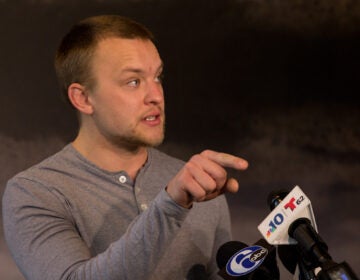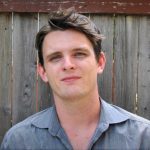Why did Philly entrust a vaccine program to a young student group with no health care experience?
Philadelphia formally cut ties with 9-month-old Philly Fighting COVID on Monday. There were clear warning signs much earlier, some say.
Listen 5:08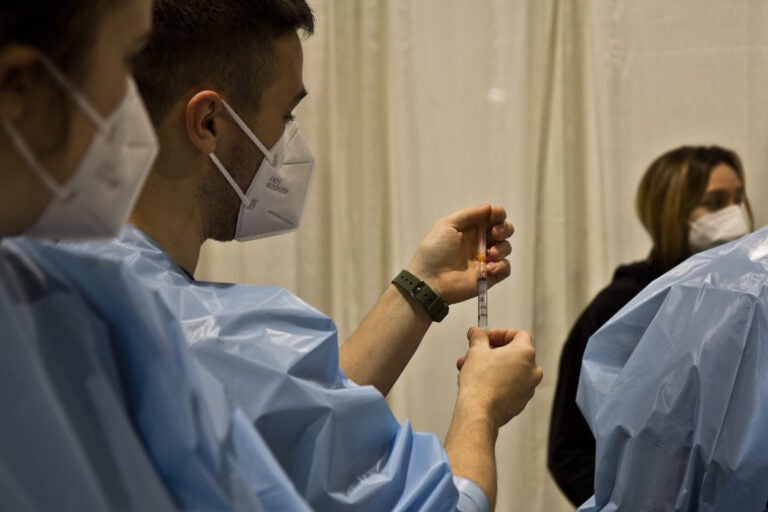
A nurse trains others on how to administer a COVID-19 vaccination at Philly Fighting COVID's vaccination clinic at the Pennsylvania Convention Center on Jan. 8, 2021. (Kimberly Paynter/WHYY)
Ask us about COVID-19: What questions do you have about the current surge?
Updated 10:50 a.m. Thursday
On a cool night in early October, Andrei Doroshin stood on the rooftop of an apartment building near Temple University in front of a dozen of his staff and volunteers. More people joined via livestream to watch the 22-year-old CEO of Philly Fighting COVID unveil his plan to vaccinate the city of Philadelphia.
Slide after PowerPoint slide delineated his vision, from scheduling to staffing to safety protocols. The marketing plan hinged on inoculating local celebrities like Meek Mill to attract their fan base.
“This is a wholly Elon Musk, shooting-for-the-heavens type of thing,” Doroshin said. “We’re gonna have a preemptive strike on vaccines and basically beat everybody in Philadelphia to it.”
They would eventually scale to five major hubs and 20 smaller community nodes, with ambitions to vaccinate between 500,000 and 1.5 million people, he proposed. And they would get rich doing it.
“This is the juicy slide,” said Doroshin, clicking through to a screen on the financing plan. “How are we gonna get paid?” He walked the staff through the plan to get the vaccines for free from the federal government and bill insurance companies $24 a dose.
“I just told you how many vaccines we want to do — you can do the math in your head,” he said.
A month later, Doroshin made a similar presentation, complete with colorful maps and a $2.7 million projected budget, to Philadelphia City Council. He said his Philly Fighting COVID team had begun submitting plans for the construction of five high-capacity sites that could take 10,000 patients a day.
Two months after that, the Philadelphia Department of Public Health and Mayor Jim Kenney’s administration handed the group the keys to make Doroshin’s vision come true — a non-contractual, no-cost deal to deliver thousands of vaccines and open up the city’s first mass testing site.
The entire house of cards came tumbling down within weeks, long before PFC could invite Meek Mill to get the jab.
A series of investigative articles by WHYY News and Billy Penn showed that the organization had pivoted to a for-profit vaccine program at the expense of the community testing obligations on which it built its legitimacy, all while the CEO bragged about becoming a millionaire to his staff. PFC’s vaccine pre-registry proved to be a disaster that left patient data without official oversight. Last weekend, Doroshin was allegedly seen pocketing extra vaccines at the Convention Center after his clinical staff turned away patients.
Doroshin had earlier called those reports of his taking vaccine doses home “baseless” and ignored repeated questions from WHYY and Billy Penn for interviews. But on Thursday, Jan. 28, in an interview with NBC’s “Today,” he admitted he took doses home, saying four were left over after the mass vaccination clinic. Doroshin said he and his team called everybody they knew.
In the “Today” interview, Doroshin admitted that he is not a nurse, and is not qualified to give the vaccine. But he also said he stood by that decision, calling it a mistake that he made but not a mistake of the organization. He did not explain why Philly Fighting COVID turned away people, including seniors, who were in line waiting for the vaccine that same day.
The city formally cut ties with the 9-month-old organization on Monday, citing language in the for-profit’s new privacy policy that would allow it to sell patient data. The abrupt decision left thousands of patients — those who had already received shots and those scheduled to get their first doses — scrambling for answers.
Why did the city trust a group of self-described “college kids” with little health care experience to run an operation of this magnitude?
The ostensible adults in the room have downplayed responsibility. Amid the fallout on Tuesday, city Health Commissioner Dr. Thomas Farley said there had been no warning signs. Philly Fighting COVID had run a largely successful testing operation under a city contract. Doroshin came to them with a vaccine plan, he said, that met the city’s health standards.
“I hope people can understand why on the surface this looked like a good thing,” Farley said. “In retrospect, we should have been more careful with this organization.”
There were clear warning signs, though. Such as when the organization lost key demographic data after its first days of vaccinating due to an Amazon cloud “glitch.” And despite Farley’s claim, the city had other options to choose from for a mass vaccination partner. Penn offered to ramp up community vaccination efforts as far back as November, well before the city started its non-contractual agreement with Philly Fighting COVID, WHYY confirmed.
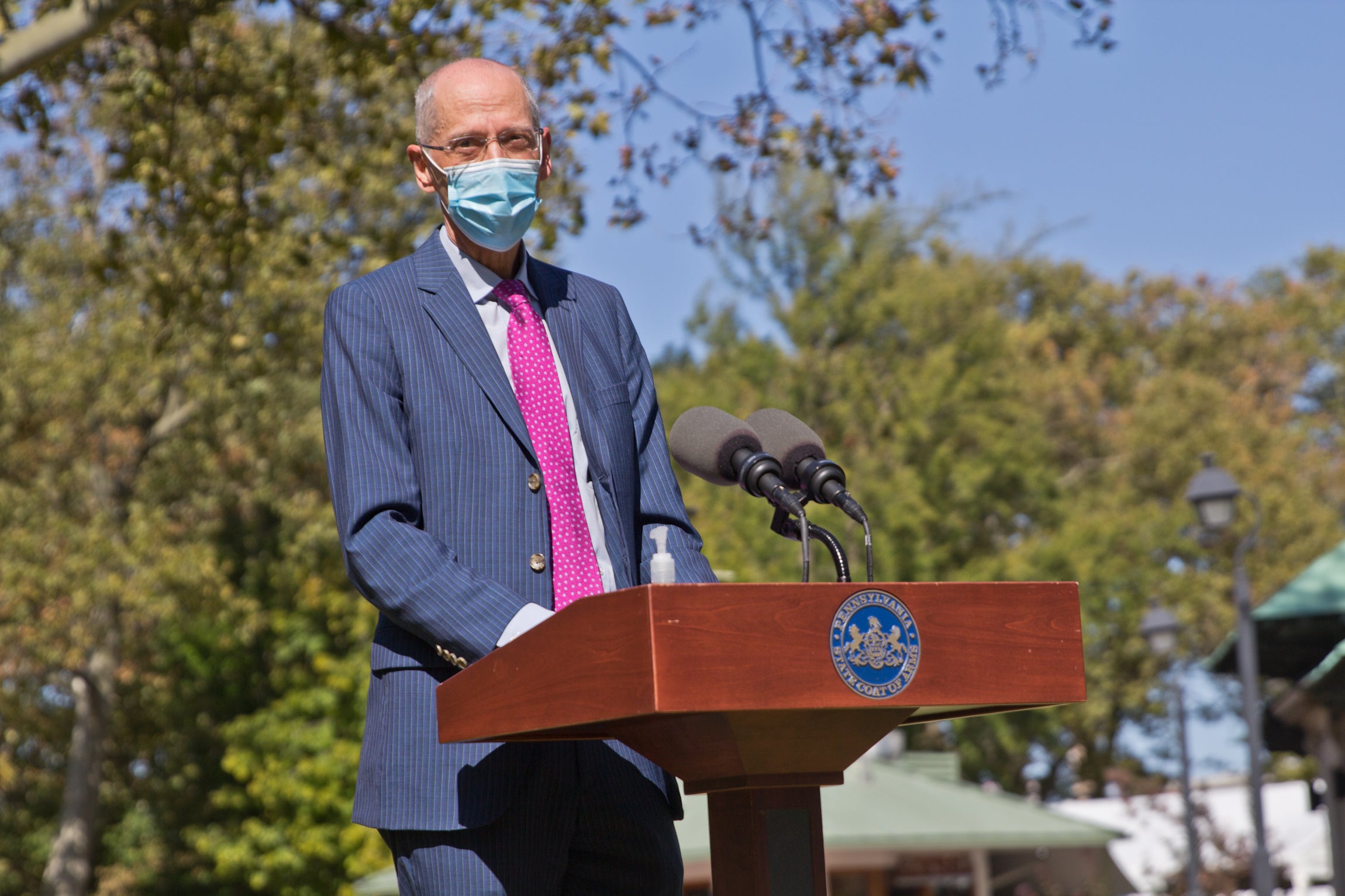
If the Health Department had peeked beneath the slick PowerPoint videos and the organization’s blustery CEO, officials would have found a well-intentioned but inexperienced group in over its head.
Interviews with dozens of people who worked for and with Philly Fighting COVID within the last nine months paint a story of a precocious organization run by a hot-headed Drexel graduate student with little oversight. Former PFC staffers said Doroshin fostered a toxic work environment replete with public outbursts, impulsive firings, and a cliquish culture of gossip and impropriety on testing sites, where he often encouraged staff to skirt best health practices in the name of efficiency.
Doroshin has declined repeated requests for interviews with WHYY. Speaking to other publications, he has dismissed the claims of pocketing vaccines as “baseless” and maintained his organization did everything by the book.
“We’ve done the job,” Doroshin told Philadelphia Magazine. “We’ve delivered. That’s the crazy part. When somebody does the job and completes the contract, you don’t fire them; you say thank you.”
‘Andrei was like a prophet’ — and a toxic boss
Philly Fighting COVID swiftly earned accolades for its work, first manufacturing PPE and later establishing a low-barrier, citywide testing operation. Patients and community members who got tested at PFC events reported good experiences.
The start-up team, an army of 20-somethings with backgrounds in marketing, medicine, and engineering, seemed to have good intentions. Hordes of medical and pre-med students from Temple and Drexel joined the group. It gave them an opportunity to add important volunteer hours to their resumes, but also gave them meaning — a way to help save Philadelphia from COVID-19.
Doroshin’s younger brother even joined the team. The kids, it seemed, might just get the job done.
“At first, I admired him,” said one former staffer. “Andrei was like the prophet for any pre-med student. He was a gift sent from God.”
Behind the scenes, however, Doroshin’s short temper and unchecked authority created a work environment that functioned more like a high school TV sitcom than a professional medical operation, according to staffers and volunteers, many of whom requested that their names be withheld for fear of retribution.
Members of the executive team would go out of their way to mention which volunteers they liked and didn’t, former volunteers said. Doroshin promoted and demoted staff based on favoritism, several people alleged, resulting in a constantly churning staff. Several were fired in dramatic, public outbursts in front of patients; others were let go through whisper networks, without even being notified in writing.
Three sources independently described a scene at PFC’s testing site at the Fillmore in Fishtown in which Doroshin erupted, cursing out staffers and threatening to call the police as a queue of patients watched from their cars.
“I get the pressure when you’re a CEO and you’re 22 and you’re running operations like this, but the way he sometimes just goes off was a little concerning,” said a former Philly Fighting COVID staffer.
Often, staffers said, Doroshin would apologize after his outbursts. But his mercurial leadership appeared to bleed into day-to-day operations. Multiple sources said he often brushed aside questions from people with more clinical experience.
“He would answer questions with, like, ‘Don’t worry, bro,’” said Debbie Flamholz, a registered nurse who worked for Philly Fighting COVID until she resigned in December.
After months of positioning PFC as a community partner by performing city-funded testing, Doroshin quietly founded a for-profit arm called Vax Populi Inc. to begin billing insurance companies for vaccine reimbursements.
Within weeks, he would completely abandon testing operations to chase his PowerPoint vision.
Age and lack of experience ‘have no bearing’?
Over weeks of questioning, the city Health Department maintained Doroshin’s age and lack of medical background was of no consequence in the decision to entrust PFC with vaccines.
“I’m not comfortable with this question,” said James Garrow, Health Department spokesperson, when asked to comment on the CEO’s inexperience. “Dr. Farley’s feelings on Mr. Doroshin or his age have no bearing on this situation. Philly Fighting COVID as an organization has met the requirements needed to distribute vaccine.”
Conducting business with Philadelphia government has long been a “who you know, not what you know” affair, so Doroshin’s quick inculcation mystified many in City Hall.
It’s unclear whether anyone in the Kenney administration examined the CEO’s resumé before giving him access to the vaccines counted on to beat back the global pandemic.
Doroshin was raised largely near Palm Springs, California. His now-removed bio on the Philly Fighting COVID website touted a long list of professional pursuits: filmmaker, nonprofit founder, entrepreneur, real estate investor, graduate student.
He cited his first professional experience in Los Angeles, where “he worked his way up to director of photography” for A.N.D. Productions. Little online evidence of the company exists, except for California incorporation papers filed by his father, Serge Doroshin, a California real estate developer.
The younger Doroshin claimed to have founded the “Rancho Mirage Film Department,” but the City of Rancho Mirage confirmed no such department exists; rather, it was the high school’s film department. Andrei Doroshin also presented himself as a movie director, promoting videos about airsoft guns, lifting weights, being successful, and one short film called “EPAC” about a sniper.
Doroshin has repeatedly mentioned his work with a group called Invisible Sea as relevant experience for working with economically stressed communities in Philadelphia. In his video application to attend Drexel University, he claimed the nonprofit helped enact legislation to improve air quality around the Salton Sea area in Southern California.
“On my bio, it says I’m a filmmaker,” a 17-year-old Doroshin said during a 2015 TedXYouth talk, “but in reality, I’m kind of not doing that anymore. Now I’m in the air quality business.”
Invisible Sea’s online presence includes some promotional videos, a dormant Twitter account, and a fundraiser that netted $684 out of a $50,000 goal.
Luis Olmedo, the executive director of Comite Civico del Valle, a SoCal nonprofit that has worked on health and air quality issues for more than two decades, had no recollection of Doroshin or the work he claimed to do. “Never heard of him,” Olmedo said. “The Salton Sea has gotten worse, not better.”
Doroshin acknowledged to Philly Mag that the nonprofit “didn’t do very well,” and that some of the items in his biography should not have been included.
Even after the revelations of the last week, Philly Fighting COVID’s CEO still has some defenders — including City Councilmember Bobby Henon, who praised the group’s work.
Other lawmakers and community leaders shared concerns about his brash demeanor. “If I had him in front of me, I would have punched him,” said one state lawmaker, speaking on condition of anonymity, about a conversation with Doroshin.
Numerous members of City Council are now questioning the city’s relationship with the group, arguing red flags were everywhere.
“City officials should have definitely ended this partnership as soon as PFC stopped meeting their obligation to conduct COVID-19 testing in vulnerable communities,” said Councilmember Jamie Gauthier.
Health institutions offered to help. The city turned them down.
When the Convention Center clinic launched on Jan. 8, Philly Fighting COVID received praise for stepping up at a critical time. But the decision to allow a 9-month-old organization to run a mass vaccination program mystified people in the region’s robust medical sector from the start.
Dr. Ala Stanford of the Black Doctors COVID-19 Consortium, whose volunteers had for months been going into neighborhoods to get testing to communities most affected by the pandemic, said she had been preparing for a Feb. 1 vaccination program rollout.
“I’m not sure why they went to [PFC],” Stanford said. “We could have done what they did. We would have been the logical choice to ask. Haven’t we proven ourselves?”
Her group has since been allotted vaccines as well.
Health Commissioner Farley acknowledged this week that he assumed the city’s major medical institutions would be too busy vaccinating their own staffs and handling surging COVID patients to be able to help on the community level.
When pressed, Farley admitted he never actually asked for the hospitals’ help.
The Health Department later clarified that on a routine Dec. 22 call with the hospitals’ chief medical officers, emergency preparedness, and on-site vaccine management staff, a Health Department staff member asked if hospitals would be willing to vaccinate populations beyond their own staffs. Many health systems expressed openness to supporting vaccinations of other populations after their workforce had also been vaccinated. Farley was not on that call.
Some health systems offered to assist with exactly this type of effort.
“Penn Medicine is prepared to support the Philadelphia Department of Public Health in any community-based vaccination efforts for health care workers and others outside the Penn Medicine system,” Penn Medicine chief medical officer PJ Brennan told City Council in November.
Tony Reed, chief medical officer at Temple University Hospital, said that at first community vaccinations might have been a heavy lift, but as coronavirus case spikes have died down in recent weeks, Temple was happy to help.
“We all said, ‘Tom, I think we’re at a point now that we have capacity to do more and more,’” Reed recalled saying at one of the weekly meetings health system chiefs have with the commissioner. “I was running about 300 [vaccines] per day, I can do about 600-1,000 per day.”
Medical info ‘flying into the general space’ under I-95
After the city cut ties with Philly Fighting COVID this week, Commissioner Farley claimed there hadn’t been warning signs about Doroshin or the organization. He repeatedly said a successful first weekend of mass vaccinations proved the group could deliver on its promise.
But even he knew about early missteps.
That first trial run at the Convention Center was meant to inoculate home health workers, with an eye to making a dent in the city’s starkly disparate vaccine rates for Black Philadelphians. But PFC lost all of its racial and ethnic data for the patients, according to a Jan. 14 letter from Farley to Council President Darrell Clarke’s office that was obtained by WHYY.
A glitch in the Amazon cloud, Farley said in the letter, meant there was no racial or ethnic breakdown of who Philly Fighting COVID had vaccinated that weekend.
Flamholz, the former PFC nurse, said she was often one of the only people with any clinical experience at the start-up’s Fishtown testing site, while designated supervisors were absent, distracted or, at times, asleep.
And nobody seemed overly concerned with patient privacy. Flamholz said there was no paper shredder on site, as is standard for a medical operation. It wasn’t uncommon for identifying documents to go directly into the Fillmore dumpster — or in some cases, blow away.
“It was just someone’s personal information flying into the general space that is the [I-95] underpass,” she said.
Flamholz was tasked with creating a training protocol for flu vaccinations, but after repeatedly asking for details about where the shots would be coming from and who would be allowed to administer them, she eventually resigned.
She and numerous others also reported chasing after their paychecks, and hounding PFC execs for billable hours. Doroshin, meanwhile, appeared to use his personal Venmo account to make official PFC payments, interspersed with crude sex jokes. The organization submitted illegitimate invoices for its city-funded testing, Philadelphia Magazine reported.
Still, the city found itself needing to inoculate health care workers outside of hospitals sooner than expected — and Philly Fighting COVID was there, with its colorful maps and fancy schematics, ready to go.
Even Doroshin was surprised to be tapped so soon. He told his staff back in October that he wasn’t expecting to start vaccinating until Phase 2. Some of the city’s closest partners were taken by surprise at the city’s non-contractual agreement to provide vaccines to the young group.
“I didn’t know that was happening,” said Stanford, of the Black Doctors COVID-19 Consortium, who sits on the city’s vaccine advisory committee, as does Doroshin.
“Usually anything COVID in the city of Philadelphia, I know.”
It’s ‘growing pains,’ health official tells cancer patients
Working as partners, the Health Department cosigned Philly Fighting COVID’s online sign-up form, encouraging everyone in Philadelphia to “begin the registration process for a vaccine by pre-committing for a vaccine at www.PhillyFightingCovid.com.”
A week later, the city changed its mind. “We’re not using it, not reviewing it, not checking it,” Health Department spokesperson James Garrow told WHYY on Jan. 15.
Chaos ensued. On Jan. 19, two cancer patients emailed Amber Tirmal, the Health Department’s immunization program manager, about their failed efforts to get on PFC’s sign-up list. Timbal acknowledged there were issues.
“I know they are working on getting some better communications pieces in place, but their organization is definitely having some growing pains,” Tirmal wrote to the patients.
Yet for two weeks afterward, the city continued to give PFC more vaccine doses.
The group’s astral trajectory came to a stunning halt when the city finally severed ties, claiming it wasn’t aware of an updated privacy agreement on the registry site that allowed the group to monetize collected information.
In a statement, Doroshin said he never had any intention of selling data, and swore he corrected the language in the privacy policy as soon as he became aware of it. In interviews, staff concurred that data harvesting was never openly discussed.
Then even more serious allegations surfaced.
As the Convention Center vaccination clinic wound down last weekend, staff and volunteers were encouraged to call family and friends to hustle in and get leftover doses, and the crowd of patients began to shift in demographics from older and sick to the general public, according to three volunteers on site.
Two volunteers said they also witnessed young, unlicensed staffers vaccinating one another at the end of the evening, without supervision or the proper 15-minute waiting period after the shots.
Most alarming of all: Doroshin was seen pocketing vaccines around closing time at the Convention Center on Saturday, WHYY and Billy Penn reported. Three people confirmed a photograph circulated later that night on Snapchat of the young CEO holding syringes, appearing to prepare off-site administration to an unknown person. (Doroshin dismissed the four witness accounts as “baseless.”)
What happens next?
Vaccinations have begun at city health centers in North Philadelphia, and at least three of the large local medical systems have applied for city funds to distribute vaccines in the community. The Health Department has said it may staff a mass clinic on its own to make sure all of PFC’s former patients get their second doses.
People who signed up at the PFC registry are being encouraged to re-register at the city’s own site.
What repercussions await Philly Fighting COVID, Doroshin, or the officials who trusted him remains to be seen. City Council plans hearings into the matter, and both District Attorney Larry Krasner and Pennsylvania Attorney General Josh Shapiro have invited anyone with information about wrongdoing to come forward.

Get daily updates from WHYY News!
WHYY is your source for fact-based, in-depth journalism and information. As a nonprofit organization, we rely on financial support from readers like you. Please give today.


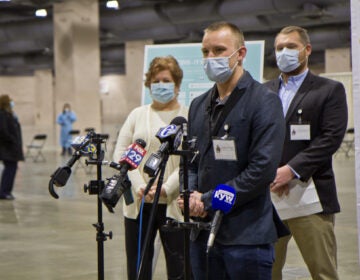
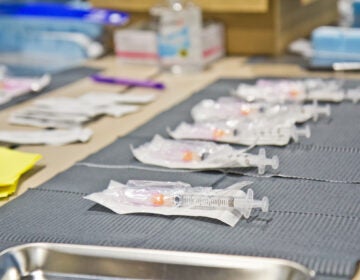

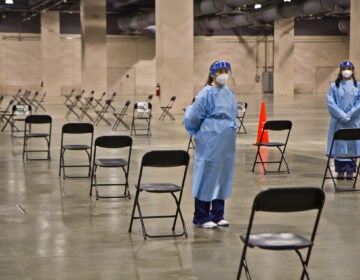
![CoronavirusPandemic_1024x512[1]](https://whyy.org/wp-content/uploads/2020/03/CoronavirusPandemic_1024x5121-300x150.jpg)



